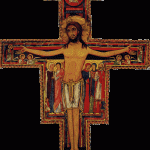In his “Four Books to the Church,” Salvian wrote what could be seen as a prophetic criticism concerning the state of the church of his day. The trouble he faced was that Christians were no longer expected to be Christians. They entered the church for political or social reasons, but they wanted their lives to remain relatively unaffected. The rich and powerful wanted accolades from the church without having to change their way of life, and as with many societies, they became representative of people knew of Christianity, leading others to follow their example and seek to become rich and powerful as well. For this reason, Salvian indicated that Christians needed to be chastised because they had given up love of God and neighbor for the love of money.
![Avarice by Jesus Solana from Madrid, Spain [CC BY 2.0 (http://creativecommons.org/licenses/by/2.0)], via Wikimedia Commons](https://wp-media.patheos.com/blogs/sites/637/2017/02/Avarice-201x300.jpg)
Moreover, Salvian pointed out, as the love of money is the root of all evil, following the path directed by avarice does not merely lead to more avarice, but to a diversity of sin, for it is a spiritual disease which forms around money as an idol:
Of all the other serious and mortal diseases which the old and most foul serpent breathes upon you with the terrible envy of his death-dealing rivalry and the most loathsome breath of his poisonous mouth, I do not know whether any other can undo you with a disease more bitter for faithful souls, and a stigma more loathsome for your children, than avarice. It is slavery to idolatry – a vice which many among you think of little account, when, without the fruit of mercy and kindness, you give yourselves in this life to possessions committed to you by God for a holy deed, and extend your sin even into the future after death.[1]
Knowing the sharpness of his criticism would likely make him a target of political forces which hated his condemnation, but also the glory he might receive from those who appreciated his work, Salvian wrote the “Four Books to the Church” under pseudonym, Timothy. While it is clearly his work, he sought to put a distance between it and himself, discussing it with his bishop as if he were discussing a text written by some unknown person. Yet, since he would write as if he understood the intention of the author itself, discussing in the third person factors which only the author could know, he gives enough indication for all that he was indeed its author, explaining to his bishop the point of the pseudonym was to point away from self-glorification and rather, the glorification of God. The name, Timothy, he said was itself indicative of the intent, for the name indicates someone desired to honor God instead of themselves. honors God. [2] Having explained the anonymous nature of the book, and the symbolic meaning of the name chosen for its author, Salvian then summarizes what could be seen as the major lesson intended by the text itself: “The writer whom I have mentioned saw the manifold insidious diseases of almost all Christians and realized only that not all things did not stand in second place to God, but almost all things were preferred to God. The drunken seem to spurn God in their drunkenness, the greedy in their greediness, the unchaste in their lust, the cruel in their cruelty.”[3]
Salvian understood that the problem of avarice is that it was idolatry. To put anything before God is idolatry. Anything which is not God which is put up and lifted up as one’s primary or first interest becomes that which will lead a person away from God, and, if such attachment to that which is other than God remains unopposed, it will lead them to perdition. “You shall have no other gods before me” (Ex. 20:3 RSV). God is our refuge. God, not riches, will save us. God, not nation, must be first in our hearts, as the Psalmist wrote:
On God rests my deliverance and my honor; my mighty rock, my refuge is God. Trust in him at all times, O people; pour out your heart before him; God is a refuge for us. Selah Men of low estate are but a breath, men of high estate are a delusion; in the balances they go up; they are together lighter than a breath. Put no confidence in extortion, set no vain hopes on robbery; if riches increase, set not your heart on them (Ps. 62:7-10 RSV).
When a nation itself is based upon riches and uses money as indication of one’s value, that nation deserves rebuke. We can desire the best for our people, but the best has to be moral and just, for it if is not, then it is not the best, and where injustice remains, there the best is not established. Rebuke for injustice is therefore necessary to help make a nation the best it can be, while idolizing the excesses that form around some abuse is the way to prevent it from achieving its great potential. Centering itself upon the greatness of the rich who made their path in the world through the dictates of avarice will lead a nation to hell.
![Elephant Origami [Public domain], via Wikimedia Commons](https://wp-media.patheos.com/blogs/sites/637/2017/02/Origami_made_from_an_American_1-dollar_bill_of_an_elephant-300x225.jpg)
Indeed, to think that money, or the resources which it represents, is absolutely ours to possess, and so we have no obligation to consider its proper use, leads not only to making money an idol, but it brings in the rest of the vices avarices establishes with it like a new pantheon which displaces the true faith.
Christians must realize that money is meant to be a tool, to help establish justice for all; it is meant to be shared, to circulate, so that all can be blessed by it, as St John Chrysostom declared:
For our money is the Lord’s, however we may have gathered it. If we provide for those in need, we shall obtain great plenty. This is why God allowed you to have more; not for you to waste on prostitutes, drink, fancy food, expensive clothes, and all the other kinds of indolence, but for you to distribute to those in need. Just as an official in the imperial treasury, if he neglects to distribute where he is ordered, but spends instead for his own indolence, pays the penalty and is put to death, so also the rich man is a kind of steward of the money which is owed for distribution to the poor. He is directed to distribute it to his fellow servants who are in want. So if he spends more on himself than his need requires, he will pay the harshest penalty hereafter. For his own goods are not his own, but belong to his fellow servants. [4]
The love of money is promoted by what money can offer, the pleasures which people see coming out of its possession. The more inordinate pleasure is promoted instead of justice, the more the love of money becomes promoted, turning the accumulation of money as the highest good, even at the expense of innocent people who are trampled in its acquisition. A society which puts money first, and then suggests we must bow down and respect the wealthiest nation as first above all other things, will only be a society which follows the inhospitable evil of Sodom and Gomorrah. And so, Salvian explained:
Because today instead of these pristine virtues, avarice, greed, plunder, and whatever is associated with them have replaced them. To these vices are joined, as by sisterly unity, envy, enmity, cruelty, lust, shamelessness, and destruction, because the former vices fight by using the latter.[5]
Idolatry destroys the soul, and with it, the virtues which we should seek are replaced by great vices. To hide the damage done, the nation which embraces such denigration of society presents itself as great because of the great luxury some within it possess, ignoring how it is hollowing itself out from within and will soon collapse. The church which puts itself in union with such a hollow structure will feel the consequences of its shame once that structure collapses. Therefore, as Salvian indicated, the church needs to remember who it is called to follow, God, because once mammon replaces God, the gates of hell will unleash its fires and those within will be burned, even if not consumed, because of their sin.
[1] Salvian, “The Four Books of Timothy to the Church” in Salvian The Presbyter. trans. Jeremiah F. O’Sullivan, PhD (Washington, DC: Catholic University of America Press, 1962), 269.
[2] See Salvian, Letter Nine in Salvian The Presbyter. trans. Jeremiah F. O’Sullivan, PhD (Washington, DC: Catholic University of America Press, 1962), 262.
[3] Ibid., 258.
[4] St John Chrysostom, On Wealth and Poverty. trans. Catharine P. Roth (Crestwood, NY: St Vladimir’s Seminary Press, 1984), 49-50.
[5] Salvian, “For Books to the Church,” 270.
Stay in touch! Like A Little Bit of Nothing on Facebook:
A Little Bit of Nothing













